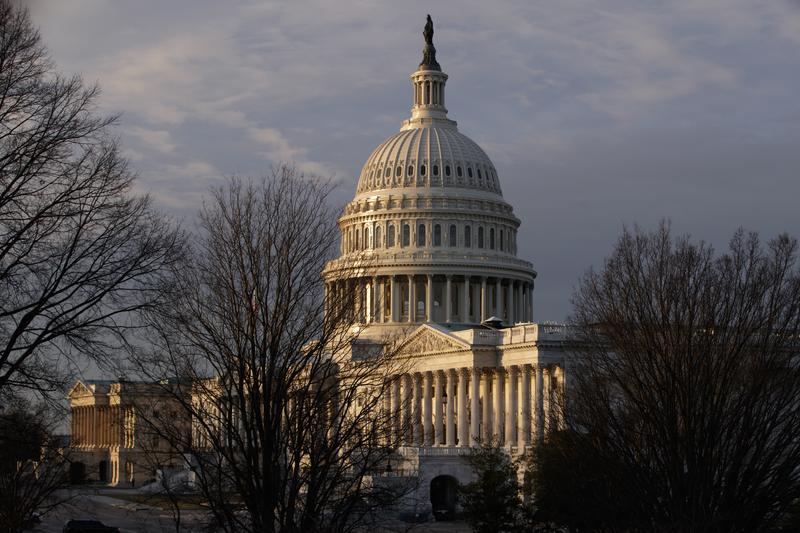BOB GARFIELD: In the chaotic first month of the Trump administration, news audiences have been served countless stories about nascent rifts between the White House and congressional Republicans, private sniping and even public criticism, which seems to foreshadow a fractured majority and political paralysis. As recently as Thursday, a New York Times headline declared, GOP's Grand Visions for Congress Now Looking Like a Mirage - not necessarily. While such big-ticket items as tax reform and the repeal of ObamaCare have been stymied by policy divisions within the GOP, paralysis it ain't.
Lisa Mascaro, who covers Congress for the LA Times, says, on the contrary, while we were all gaping at the spectacle of the National Security Council, Congress was over yonder swinging a wrecking ball. An array of Obama-era regulations on guns, the environment, finance are in rubble, with more to come.
LISA MASCARO: Yeah, the first one that President Trump signed into law earlier this week was one that would halt what had been a bipartisan effort under the Dodd-Frank financial overhaul, back under President Obama, to require companies to report when they made donations to foreign governments. It was an effort to stem bribery and it was particularly aimed at the extraction industries, oil and gas. That got rolled back. The Republicans argue that that and pretty much all of the regulations that they are taking aim at are undue burdens on industry, on Americans, that they are part of what has contributed to the slow growth of the economy.
BOB GARFIELD: But that's not all because there is also guns.
LISA MASCARO: Right, another Obama-era rule that would have required background checks on recipients of Social Security disabilities because of a mental disability, that they would have to additionally go through a background check. The administration had been working on for years and years to get this rule finalized. It was fallout from the mass shooting at Virginia Tech. The House and Senate rolled back that regulation and sent it off for the president's signature.
BOB GARFIELD: And there’s more in the pipeline, no?
LISA MASCARO: They do think that dozens more can make it through the pipeline. Some that have passed the House and still have to be acted on in the Senate include a regulation to undo new rules on burning off methane gas at worksites. There's one that would roll back the limits on hunters, intended to prevent hunting of bear cubs and certain wolves. There was also one the House passed today on Planned Parenthood. The original regulation would guarantee that federal funding that goes to the states for Title X family planning could not be blocked to groups like Planned Parenthood. So the Republicans were set to approve a rollback of that measure, so that states could block the federal money going to Planned Parenthood or other family planning clinics that offer abortion.
BOB GARFIELD: Regulations are a product of the Executive Branch, and there was a [LAUGHS] long process of promulgation and review, public comment, and so forth, before they can be made official. But Congress, through a piece of legislation called the Congressional Review Act, can actually just undo any regulation, no matter how long it's taken to become consensus and to go into effect. How does that work?
LISA MASCARO: So there’s this little-known act, as you mentioned, the Congressional Review Act. It’s rarely been used in the 20-some years it’s been on the books. What it does is it enables the Congress to swiftly roll back these regulations through a simple majority vote in the House and in the Senate. And that’s important because, you know, in the Senate we hear a lot about the filibuster and the need to get 60 votes in the filibuster to get anything done.
Well, the Congress right now is controlled by Republicans. They have a majority in the House. They have a very narrow majority in the Senate, 52 Republican senators, so getting to that 60 would be really hard. But they can use this Congressional Review Act to sort of fast track these items through the Senate. The Act is limited. It’s only able to be applied to rules that have been put forward by the administration in the past 60 legislative days, basically June of 2016. So Congress is quickly identifying those and working through processing those, or they lose that fast-track authority.
BOB GARFIELD: Well, if there’s urgency, luckily for Congress, they have third parties who are out there pointing them to the rules that most require their attention, and that third party is?
LISA MASCARO: So the network backed by the Koch brothers, groups like Freedom Partners and Americans for Prosperity, advocacy groups fighting for small government, limited government, free market policies. After the November election, what the Koch network was able to do was to help prioritize and shape the agenda by bringing to the Republican leaders in Congress and Republican lawmakers sort of a blueprint, as they called it. It’s a multistep process for how to target some of these regulations that you could roll back now and then which ones you would look at taking a stab at later.
BOB GARFIELD: Lisa, thank you very much.
LISA MASCARO: Thank you for having me. I appreciate the time.
[MUSIC UP & UNDER]
BOB GARFIELD: Lisa Mascaro covers Capitol Hill for the Los Angeles Times.
Coming up, Donald Trump is exactly like – well, nobody. This is On the Media.

